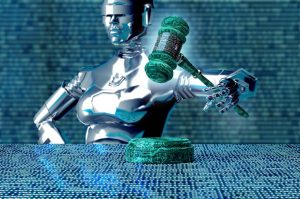 Technology and courts have never been a great match. After all, judges are concerned with precedent, while the technology adoption process is future-facing. Certainly, the pandemic helped reduce the friction somewhat when, out of necessity, the courts acclimated to e-filing and virtual court proceedings. Some judges even acknowledged the value and convenience of online appearances for certain matters.
Technology and courts have never been a great match. After all, judges are concerned with precedent, while the technology adoption process is future-facing. Certainly, the pandemic helped reduce the friction somewhat when, out of necessity, the courts acclimated to e-filing and virtual court proceedings. Some judges even acknowledged the value and convenience of online appearances for certain matters.
Despite the notable adaptation and changing attitudes, our judicial counterparts were wholly unprepared for the generative AI (GenAI) tsunami and its impact on the practice of law. Since the release of GPT-4 a year ago, lawyers have increasingly relied on the output of GenAI tools to draft and submit pleadings and memoranda to the courts, often without a full understanding of the technology and its capabilities.
As a result, many lawyers have made the news for submitting court filings with GenAI-generated fake case citations despite being repeatedly warned to carefully review all GenAI output. Judging by the uptick in headlines since the start of 2024, more lawyers than ever are relying on GenAI tools for legal research but are utterly failing to meet their ethical obligations of basic competence:
- A lawyer was sanctioned by Massachusetts Superior Court for filing multiple memoranda replete with false case citations (2/12/24).
- A British Columbia lawyer was reprimanded and ordered to pay costs for opposing counsel to discover precedent was AI “hallucination” (2/20/24).
- A Florida attorney was suspended by U.S. District Court for the Middle District of Florida for filing submissions relying on false case citations (3/8/24).
- An attorney, a pro se litigant, was called out by the court for submitting false case citations to court for the second time, and the case was dismissed following a grant of summary judgment on other grounds (3/21/24).
- The 9th Circuit summarily dismissed a case without addressing the merits because of the attorney’s reliance on fake cases (3/22/24).
To be clear, these situations reveal an inability to meet basic competence obligations. This isn’t an issue of technology competence. Instead, these instances highlight a failure by lawyers to carefully review documents submitted to the court.
It is this dereliction that is spurring judges into action. Courts across the country are grappling with this issue, with many judges signing orders that govern GenAI usage in their courtrooms. RAILS (Responsible AI in Legal Services) has compiled a running list of these efforts. Forty-eight documents are being tracked (for now), which include orders, guidelines, and rules that are either in progress or have already been issued.
The approaches regarding regulating GenAI usage run the gamut and include: providing guidance about GenAI usage, requiring the disclosure of the use of GenAI, or banning its use altogether. As explained in the RAILS declaration statement, this haphazard and varied set of tactics, while well-intentioned, fails to provide much-needed consistency:
(T)he sheer number of these orders and lack of uniformity [in] their provisions can cause considerable confusion to litigants and practitioners who may have to appear in many different courts.
In other words, there’s disorder in the courts, with no clarity in sight.
Given the increasing number of fake case citations, one thing is clear: the phenomenon highlights evidence of an even deeper problem. Namely, some lawyers are not reviewing their work before submitting it to the court — and this is not a new occurrence.
Historically, cases that seemed out of place within the context of a document could be dismissed as mistakes or misinterpretations of case law. Now, however, false case citations undeniably demonstrate a failure to review submitted work. This type of negligence undoubtedly existed before, but it’s much easier to prove when the cited cases are nonexistent.
In other words, the problem isn’t the technology, it’s attorney competency. This is a preexisting issue, and knee-jerk reactions to GenAI are not the solution. While it’s tempting to react hastily to disruptive technologies, the legal community would be better served by developing robust, uniform educational guidelines on responsible AI use and emphasizing the timeless principles of careful review and thorough legal analysis.
Nicole Black is a Rochester, New York attorney and Director of Business and Community Relations at MyCase, web-based law practice management software. She’s been blogging since 2005, has written a weekly column for the Daily Record since 2007, is the author of Cloud Computing for Lawyers, co-authors Social Media for Lawyers: the Next Frontier, and co-authors Criminal Law in New York. She’s easily distracted by the potential of bright and shiny tech gadgets, along with good food and wine. You can follow her on Twitter at @nikiblack and she can be reached at [email protected].




